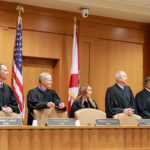CHALLENGING THE AUTHORITY OF PUBLIC OFFICIALS
Now that the election is finally over, one interesting legal mechanism to discuss is called a writ of “Quo Warranto.” This is a rarely used, yet still significant procedure, which is generally used to challenge the authority of a public official.
This process exists for both federal and Florida state officials. The use of the federal procedure is largely confined to courts located in Washington, D.C., and as a general matter cannot be brought by private citizens. See Erik W. Scharf and Wayne R. Atkins, Coram What? An Introduction to Federal Special Writs, Fla. Bar Journal (June 2011). As such, it does not warrant much discussion here. However, the Florida state equivalent is also interesting.
The writ can be used to both challenge the authority of an individual to hold a particular public office, or simply to challenge the authority of a public official to exercise certain authority he or she derived from the state. For example, the writ was successfully used in 2011 to challenge certain executive orders issued by Governor Rick Scott as exceeding the Governor’s Constitutional authority and as being in violation of the separation of powers doctrine. Whiley v. Scott, 79 So. 3d 702, 705 (Fla. 2011).
Unsurprisingly, the successful use of the writ to challenge the right of an individual to hold a particular public office (as opposed to the challenge of a particular action taken by a public official) is much rarer. Nonetheless, the Florida Supreme Court has recognized this is as a proper use of the writ. See State ex rel. Bruce v. Kiesling, 632 So. 2d 601, 603 (Fla. 1994) (“we note that the common law remedy of quo warranto is employed either to determine the right of an individual to hold public office or to challenge a public officer’s attempt to exercise some right or privilege derived from the State.”).
That being said, at least with regard to elected officials, courts place a heavy burden on petitioners. As Florida’ Fifth District Court of Appeal has explained, “[a]n election should not be set aside unless a court finds substantial non-compliance with a statutory election procedure and also makes a factual determination that reasonable doubt exists as to whether a certified election expressed the will of the voters.” Fouts v. Bolay, 795 So. 2d 1116, 1118 (Fla. 5th DCA 2001). Further, Florida Statute § 102.168 imposes a number of additional procedural requirements for parties seeking to do so.
Florida Rule of Civil Procedure 1.630 also imposes a number or procedural requirements on any petition for a special writ, which vary from the normal procedures applicable to most civil litigation. As such, any individual or entity interested in seeking such extraordinary relief would be well advised to consult an attorney who is experienced in that area of the law.
Xander Law Group is located in Miami, Florida and is dedicated to civil litigation, business litigation, commercial litigation, business law, contract law, and more. To speak to one of our knowledgable attorneys, contact us today.










